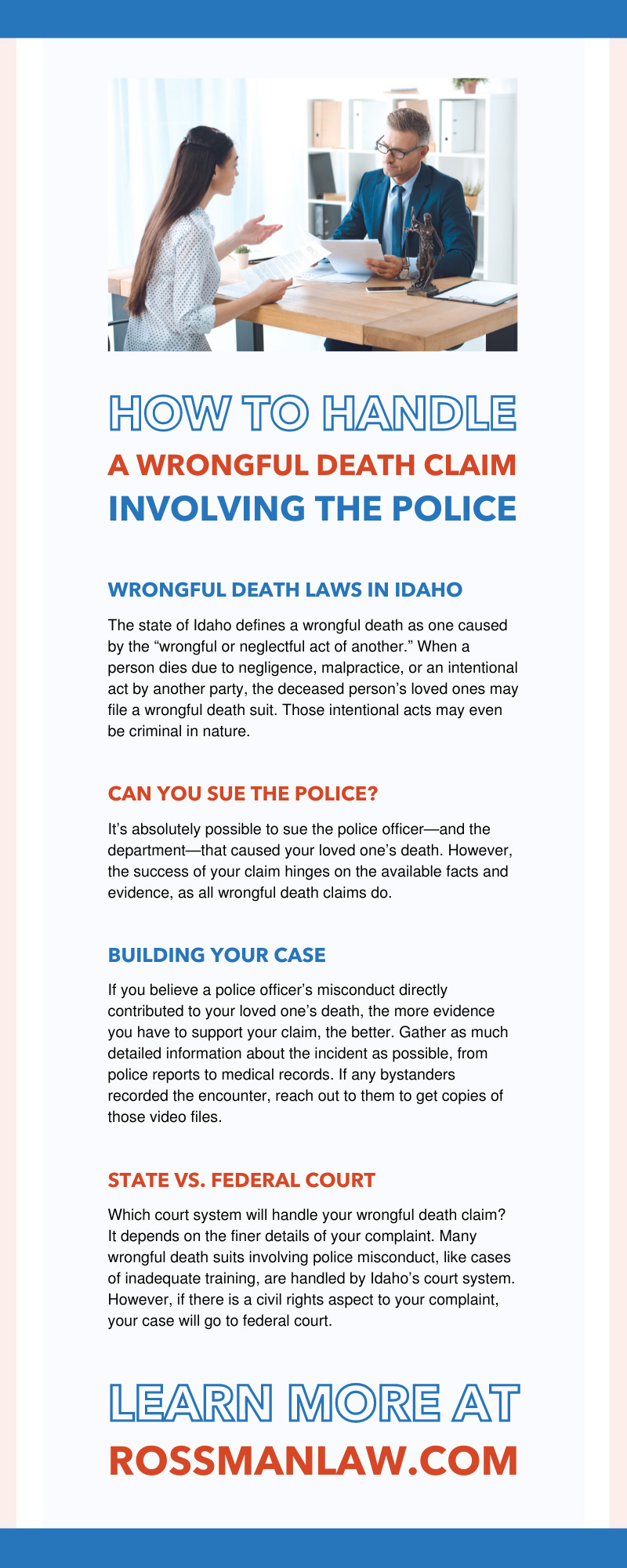
How Birth Injuries Impact the Mental Health of Parents
March 29, 2023
Can You Be Fired for No Reason in Idaho?
April 10, 2023Regular citizens want to be able to trust the police officers who patrol their communities to keep them safe and treat them with dignity. However, as anybody who follows the news can tell you, that isn’t always the case. There are many ways in which police misconduct can result in civilian injury and death.
If you are grieving the loss of a loved one who died due to the actions or inactions of a police officer, know that you are not alone. Many bereaved families have taken police officers and departments to court in wrongful death suits, and that could be an option for you, too.
How do you handle a wrongful death claim involving the police? Taking on a law enforcement entity can feel particularly daunting, but a wrongful death attorney from Rossman Law Group can be your most powerful ally. Learn more about the wrongful death claim process when it involves one or more police officers.
Wrongful Death Laws in Idaho
The state of Idaho defines a wrongful death as one caused by the “wrongful or neglectful act of another.” When a person dies due to negligence, malpractice, or an intentional act by another party, the deceased person’s loved ones may file a wrongful death suit. Those intentional acts may even be criminal in nature.
However, wrongful death claims and lawsuits are the purview of civil courts, not criminal ones. In criminal court, the defendant’s guilt must be proven beyond reasonable doubt. Meanwhile, in civil court, the defendant’s liability must be proven “by a preponderance of evidence,” which is a lower bar than reasonable doubt.
If the police officer or officers who caused your loved one’s death are found not guilty in criminal court, they can still be sued for wrongful death in civil court. It’s a common legal move made by families who do not feel that their deceased loved one got justice in criminal court.
Who Can File for Wrongful Death in Idaho?
What is your relation to the individual who died in an incident involving the police? If one of the following applies to your connection to the deceased, you may be able to file a wrongful death claim:
- The executor of their estate
- An heir to their estate
- A surviving parent, spouse, child, or stepchild
If none of the above apply but you depended on the deceased person for support or services, you may be able to sue if you are:
- A blood relative of the deceased
- An adopted sibling
- A putative spouse (you believed you were legally married, but records show you were not)
Idaho defines “support and services” as financial contributions to the household and help with chores and tasks around the house. The state makes no provision for emotional support or companionship in this category.
Can You Sue the Police?
Many grieving families are hesitant to take law enforcement entities to court, as police officers often receive a certain level of protection from legal consequences. Police officers are public servants, and they can receive qualified immunity from wrongful death claims if the investigation concludes that they acted by the book during the incident.
If you’re unsure of the legality of the officer’s actions that led to your loved one’s death, contact a wrongful death attorney in Boise, Idaho, and tell them your story. Police and attorneys will conduct a thorough investigation regarding the chain of events, measuring the officer’s conduct against department-approved protocols and techniques.
It’s absolutely possible to sue the police officer—and the department—that caused your loved one’s death. However, the success of your claim hinges on the available facts and evidence, as all wrongful death claims do.
Police Officers’ Actions and Wrongful Death
The most widely known form of police misconduct leading to a person’s death is the misapplied use of deadly force. Officers often have to make split-second decisions regarding whether to use deadly force on a civilian. Sometimes, investigations determine that the use was justified; other times, evidence shows that the officer made the wrong decision.
In 1985, the US Supreme Court ruled that police officers are only allowed to use deadly force if:
- It is the only option available to prevent a criminal from escaping
- They have probable cause to believe that the civilian in question poses a significant threat of serious physical injury or death to the officer
Misapplied deadly force incidents aren’t the only form of police misconduct that leads to civilian deaths. Police may also be held liable for a person’s death if:
- They failed to provide care to a detainee having a medical emergency
- Their reckless driving decisions led to a person’s death
- They detained somebody under false pretenses and the person died in custody
Building Your Case
If you believe a police officer’s misconduct directly contributed to your loved one’s death, the more evidence you have to support your claim, the better. Gather as much detailed information about the incident as possible, from police reports to medical records. If any bystanders recorded the encounter, reach out to them to get copies of those video files.
Did your loved one have any medical conditions that may have exacerbated their suffering during the incident? For example, if they had asthma and police refused them access to their inhaler while they were in custody, the court needs evidence of that condition. The more information you have about every angle of the death, the easier your attorney’s job will be in proving the connection between misconduct and death.
State vs. Federal Court
Which court system will handle your wrongful death claim? It depends on the finer details of your complaint. Many wrongful death suits involving police misconduct, like cases of inadequate training, are handled by Idaho’s court system.
However, if there is a civil rights aspect to your complaint, your case will go to federal court. For example, if you believe there was a racial component to your loved one’s death, your attorney may invoke the Civil Rights Act before a federal judge.
Have you recently lost a loved one due to police misconduct or excessive force by an officer of the law? Filing a wrongful death claim against the police can help you get justice if the criminal court system does not. Tell your story to one of the talented and empathetic wrongful death attorneys at Rossman Law Group, and we’ll fight in court on your behalf.






